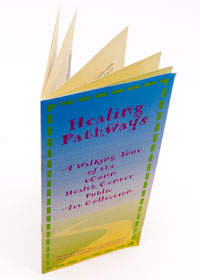Feature Story
As published in the UConn Advance, January 29, 2007.
Walking Tour Brochure Highlights Art at Health Center
By Jane Shaskan

A new brochure is available to guide and inform staff, patients, and visitors about some of the artworks in the Health Center's growing art collection.
Art is everywhere at the Health Center.
The collection now comprises more than 1,400 pieces of art valued at more than $1,000,000, thanks mainly to the generosity of individuals and artists who donate the pieces.
The brochure, Healing Pathways, was developed by the Health Center's Art Committee.
Available at the hospital information desk, Healing Pathways features the location and description of more than 20 various works of art created by accomplished artists.
“The art committee believes in the importance of an environment that gives the spirit a lift, encourages reflection and rest, generates creative thought, brings a smile, and relieves stress,” says Linda Webber, Health Center art curator.
“Art can do those things. It has healing abilities for the spirit and the body. It enhances the environment and promotes the sense of a caring community. It's intended to strengthen self-worth and provide an aesthetic experience.”
Among the art featured is Frank Stella's “River of Ponds” tapestry, with its overlapping and geometric forms draping the wall in the main lobby by the escalator.
A similar Stella tapestry is on display at the Boston Museum of Fine Arts.
Also featured is “Line Drawing” by Sol LeWitt, located along the corridor of administrative offices.
His distinct use of color, line, and shape has brought him international appeal and recognition in the area of conceptual art.
LeWitt's works are on display in Connecticut fine art museums, and in New York's Metropolitan Museum of Art, the Whitney Museum, and the Museum of Modern Art.
Connecticut artist James Grabowski, who enjoys an international reputation, is also highlighted. His mural “The DaVinci Touch,” awash with bold colors and shapes, hangs behind the main lobby's information desk.
The brochure also features sculptures by Wolfgang Behl, Jane Dedecker, James Stabeneau, and Bill Wood; paintings by Suzanne Howes-Stevens, Betty Kern, and Barbara Levin; murals by Tracy Kane and Linda Webber; bas reliefs by Bonnie Johnson; photographs by Isadore Berson; an original Babar the Elephant drawing by Laurent deBrunhoff; a commemorative quilt by Ruth de Groff; a collage by Felix Bronner; prints by Anni Albers and 19th-century Tokyo master Adno Tokutarto; and a mobile by Hans Stargardter.
Also included in the brochure is information about the “Tree of Life,” the cement bas-relief sculpture by Wopo Holup, commissioned and funded by the State of Connecticut through the Connecticut Commission on the Arts and Department of Public Works 2000, and background on the Health Center's architectural style and the vision of its designer, Vincent Kling.
The art featured is in the mezzanine, main, and lower lobbies of the main hospital entrance and the administrative hallway.
The brochure also highlights outdoor sculptures on the upper and lower campus.
“The brochure offers just a small sampling that can be easily viewed,” says Webber, “but we encourage everyone to look around and take a moment to appreciate the art that lies around almost every corner.”
The Health Center's art program was conceived in 1979 by the auxiliary and was spearheaded by Celeste LeWitt, a Health Center volunteer and art enthusiast.
Soon afterward, an art advisory committee was formed, with membership including Connecticut artists; faculty from UConn, the University of Hartford, and Central Connecticut State University; Health Center employees; and auxiliary board members.
In 1984, the auxiliary donated the collection to the Health Center.
For more information about the Health Center's art collection and changing exhibits, go to the exhibition website.


